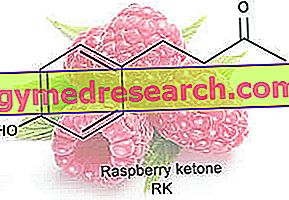Raspberry ketone is a new ingredient contained in some supplements aimed at the disposal of body fat; it is an extract of the fruit of the raspberry (in English raspberry), mostly synthesized on an industrial level (to contain costs, otherwise exorbitant) and added in concentrations up to 450 times higher than those contained in a portion of the relative fresh fruits; raspberry ketone is therefore a thermogenic active ingredient used in fat-burning supplement formulas.

What are ketones?
Ketones (C n H 2n O) are molecules composed of a carbonyl group (C = O) and two alkyl radicals (R); ketones derive from the oxidation of secondary alcohols by redox and, in the human organism, they represent the "waste" of energy production (although some tissues are able to reuse them); when the blood concentrations of ketones (or ketone groups) are excessive (due to a diet lacking or too low in carbohydrates) they perform a toxic action at the cellular level (especially for the nervous and renal systems) since their disposal is not effective enough to compensate for its accumulation.
Why do ketones, despite being toxic, now represent the basis of many "extreme" weight-loss diets?
The slimming diets that cause the increase of the ketones are used in the slimming field because these catabolites inhibit the nervous stimulus of the appetite; on the other hand, a question arises: being potentially harmful substances, what consequences could manifest themselves in the association of a ketogenic diet with the integration of raspberry ketone? I honestly wouldn't experience them on my skin ...
Theory: efficacy and mechanism of action of supplements with raspberry ketone
The integration of ketones with raspberry ketone is recommended (by the company that markets it) in the performance of slimming diets such as fat-burning and in the non-pharmacological treatment of oily-little skins and baldness.
According to the American doctor Dr. Mehmed Oz, raspberry ketone is able to reduce adipose tissue by virtue of the body's overall metabolic increase, or the mechanism that lies at the base of all other thermogenic supplements.
Some studies have observed the metabolic effects of raspberry ketone on both guinea pigs and humans; the researchers then highlighted a correlation between raspberry ketone intake and:
- Increased adiponectin (Raspberry ketone increases both lipolysis and fatty acid oxidation in 3T3-L1 adipocytes; Anti-obese action of raspberry ketone - PUBMED)
- Increased noradrenaline (catecholamine - hormone that also promotes lipolysis)
- Increased skin elasticity (Effect of topical application of raspberry ketone on dermal production of insulin-like growth factor-I in mice and on hair growth and skin elasticity in humans - PUBMED).
- Stimulation of capilliphere growth in subjects affected by alopecia.
It was therefore hypothesized that, in addition to favoring weight loss, the hormonal impact of raspberry ketone could significantly benefit even those with reduced glucose tolerance (also type 2 diabetes) or metabolic alterations of various kinds.
Ultimately, it is possible that the raspberry ketone supplement, placed in the context of a low-calorie diet, can facilitate the reduction of adipose tissue, hence generalized weight loss.
Use and side effects
At the moment there is not enough information to establish a maximum intake dose; it is true that it is a food supplement and not a drug, however, acting in a stimulating manner on catecholamines (similarly to capsicin, synephrine, caffeine etc.) it is possible that excessive doses of raspberry ketone induce nervousness, alterations of sleep and all the side effects related to the abuse of thermogenic supplements (moreover significantly aggravated by the "questionable" low-carb diets).
Dosages of about 200mg / day of raspberry ketone supplements (not pure ketones!), Split into two 100mg intakes could be effective and considered safe.
NB . the ketone raspberry ketone supplement is NOT recommended in pregnancy, lactation and under development due to lack of specific information.



